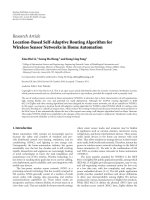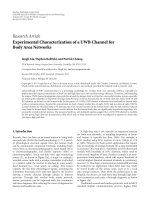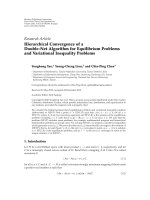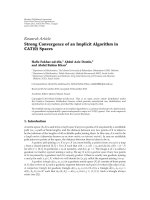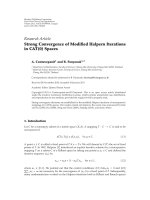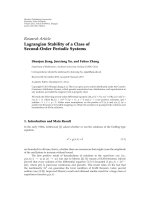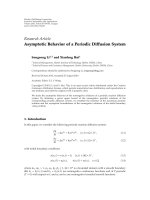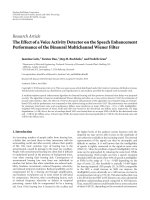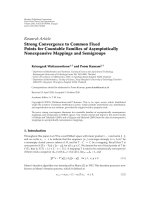Báo cáo hóa học: " Research Article Hierarchical Convergence of a Double-Net Algorithm for Equilibrium Problems and Variational Inequality Problems" ppt
Bạn đang xem bản rút gọn của tài liệu. Xem và tải ngay bản đầy đủ của tài liệu tại đây (526.59 KB, 16 trang )
Hindawi Publishing Corporation
Fixed Point Theory and Applications
Volume 2010, Article ID 642584, 16 pages
doi:10.1155/2010/642584
Research Article
Hierarchical Convergence of a
Double-Net Algorithm for Equilibrium Problems
and Variational Inequality Problems
Yonghong Yao,
1
Yeong-Cheng Liou,
2
and Chia-Ping Chen
3
1
Department of Mathematics, Tianjin Polytechnic University, Tianjin 300160, China
2
Department of Information Management, Cheng Shiu University, Kaohsiung 833, Taiwan
3
Department of Computer Science and Engineering, National Sun Yat-sen University,
Kaohsiung 80424, Taiwan
Correspondence should be addressed to Chia-Ping Chen,
Received 21 May 2010; Accepted 22 December 2010
Academic Editor: Satit Saejung
Copyright q 2010 Yonghong Yao et al. This is an open access article distributed under the Creative
Commons Attribution License, which permits unrestricted use, distribution, and reproduction in
any medium, provided the original work is properly cited.
We consider the following hierarchical equilibrium problem and variational inequality problem
abbreviated as HEVP: find a point x
∗
∈ EPF, B such that Ax
∗
,x − x
∗
≥0, for all x ∈
EPF, B,whereA, B are two monotone operators and EPF, B is the solution of the equilibrium
problem of finding z ∈ C such that Fz, yBz,y − z≥0, for all y ∈ C.Wenotethatthe
problem HEVP includes some problems, for example, mathematical program and hierarchical
minimization problems as special cases. For solving HEVP, we propose a double-net algorithm
which generates a net {x
s,t
}. We prove that the net {x
s,t
} hierarchically converges to the solution of
HEVP; that is, for each fixed t ∈ 0, 1, the net {x
s,t
} converges in norm, as s → 0, to a solution
x
t
∈ EPF, B of the equilibrium problem, and as t → 0, the net {x
t
} converges in norm to the
unique solution x
∗
of HEVP.
1. Introduction
Let H be a real Hilbert space with inner product ·, · and norm ·, respectively, and let
C be a nonempty closed convex subset of H. Recall that a mapping A of C into H is called
monotone if
Au − Av, u − v
≥ 0, 1.1
for all u, v ∈ C and A : C → H is called α-inverse strongly monotone mapping if there exists
a positive real number α such that
Au − Av, u − v
≥ α
Au − Av
2
,
1.2
2 Fixed Point Theory and Applications
for all u, v ∈ C. It is obvious that any α-inverse strongly monotone mapping A is monotone
and 1/α-Lipschitz continuous.
Recently, the following problem has attracted much attention: find hierarchically a
fixed point of a nonexpansive mapping T with respect to a nonexpansive mapping P, namely,
Find x ∈ Fix
T
such that
x − P x, x − x
≤ 0, ∀x ∈ Fix
T
. 1.3
Some algorithms for solving the hierarchical fixed point problem 1.3 have been introduced
by many authors. For related works, please see, for instance, 1–9 and the references therein.
Remark 1.1. It is not hard to check that solving 1.3 is equivalent to the fixed point problem
Find x ∈ C such that x proj
FixT
· P x,
1.4
where proj
FixT
stands for the metric projection on the closed convex set FixT .Byusingthe
definition of the normal cone to FixT,thatis,
N
FixT
: x −→
⎧
⎨
⎩
u ∈ H |
u, y − x
≤ 0, ∀y ∈ Fix
T
if x ∈ Fix
T
,
∅, otherwise,
1.5
we easily prove that 1.3 is equivalent to the variational inequality
0 ∈
I − P
x N
FixT
x. 1.6
At this point, we wish to point out the link with some monotone variational
inequalities and convex programming problems as follows.
Example 1.2. Setting P I − γA, where A is η-Lipschitzian and k-strongly monotone with
γ ∈ 0, 2k/η
2
, then 1.3 reduces to
Find x ∈ Fix
T
such that
Ax, x − x
≥ 0, ∀x ∈ Fix
T
, 1.7
a variational inequality studied by Yamada and Ogura 10.
Example 1.3. Let A be a maximal monotone operator. Taking T J
A
λ
:I λA
−1
and P
I − γ∇ψ, where ψ is a convex function such that ∇ψ is η-Lipschitzian which is equivalent to
the fact that ∇ψ is η
−1
cocoercive with γ ∈ 0, 2/η,andFixJ
A
λ
A
−1
0. Then 1.3 reduces
Fixed Point Theory and Applications 3
to the following mathematical program with generalized equation constraint:
min
0∈A
x
ψ
x
,
1.8
a problem considered by Luo et al. 11.
Example 1.4. Taking A ∂ϕ, where ∂ϕ is the subdifferential of a lower semicontinuous convex
function, then 1.8 reduces to the following hierarchical minimization problem considered
in Cabot 12 and Solodov 13:
min
x∈arg min ϕ
ψ
x
.
1.9
Let B : C → H be a nonlinear mapping, and let F be a bifunction of C × C into R.
Consider the following equilibrium problem of finding z ∈ C such that
F
z, y
Bz, y − z
≥ 0, ∀y ∈ C. 1.10
If B 0, then 1.10 reduces to
F
z, y
≥ 0, ∀y ∈ C. 1.11
The solution set of equilibrium problems 1.10 and 1.11 are denoted by EPF, B and EPF,
respectively. The equilibrium problem 1.10 is very general in the sense that it includes, as
special cases, optimization problems, variational inequalities, fixed point problems, minimax
problems, Nash equilibrium problem in noncooperative games, and others. We remind the
readers to refer to 14–30 and the references therein.
Motivated and inspired by the above works, in this paper, we consider the following
hierarchical equilibrium problem and variational inequality problem: find a point x
∗
∈
EPF, B such that
Ax
∗
,x− x
∗
≥ 0, ∀x ∈ EP
F, B
, 1.12
where A, B are two monotone operators. The solution set of 1.12 is denoted by Ω.
Remark 1.5. It is clear that the hierarchical variational inequality problem and equilibrium
problem 1.12 includes the variational inequality problem studied by Yamada and Ogura
10, mathematical program studied by Luo et al. 11, hierarchical minimization problem
considered by Cabot 12 and Solodov 13, as special cases.
For solving 1.12, we propose a double-net algorithm which generates a net {x
s,t
}.
We prove that the net {x
s,t
} hierarchically converges to the solution of 1.12; that is, for each
fixed t ∈ 0, 1, the net {x
s,t
} converges in norm, as s → 0, to a solution x
t
∈ EPF, B of the
equilibrium problem, and as t → 0, the net {x
t
} converges in norm to the unique solution
x
∗
∈ Ω of 1.12.
4 Fixed Point Theory and Applications
2. Preliminaries
Let H be a real Hilbert space. Throughout this paper, let us assume that a bifunction F :
H × H → R satisfies the following conditions:
F1 Fx, x0 for all x ∈ H;
F2 F is monotone, that is, Fx, yFy, x ≤ 0 for all x, y ∈ H;
F3 for each x, y, z ∈ H, lim sup
t0
Ftz 1 − tx, y ≤ Fx, y;
F4 for each x ∈ H, y → Fx, y is convex and lower semicontinuous.
On the equilibrium problems, we have the following important lemma. You can find it in
31.
Lemma 2.1. Let H be a real Hilbert space, and let F be a bifunction of H × H into R satisfying
conditions (F1)–(F4). Let r>0, and x ∈ H. Then, there exists z ∈ H such that
F
z, y
1
r
y − z, z − x
≥ 0, ∀y ∈ H.
2.1
Further, if T
r
x{z ∈ H | Fz, y1/ry − z, z − x≥0, for all y ∈ H}, then the following
hold:
1 T
r
is single-valued;
2 T
r
is firmly nonexpansive; that is, for any x, y ∈ H,
T
r
x − T
r
y
2
≤
T
r
x − T
r
y, x − y
,
2.2
3 FixT
r
EPF;
4 EPF is closed and convex.
Below we gather some basic facts that are needed in the argument of the subsequent
sections.
Lemma 2.2 see 32. Let H be a real Hilbert space. Let the mapping A : H → H be α-inverse
strongly monotone, and let λ>0 be a constant. Then, one has
I − λA
x −
I − λA
y
2
≤
x − y
2
λ
λ − 2α
Ax − Ay
2
, ∀x, y ∈ H.
2.3
In particular, if 0 ≤ λ ≤ 2α,thenI − λA is nonexpansive.
Lemma 2.3 demiclosedness principle for nonexpansive mappings, see 33. Let C be a
nonempty closed convex subset of a real Hilbert space H and let T : C → C be a nonexpansive
mapping with FixT
/
∅.If{x
n
} is a sequence in C weakly converging to x, and if {I − Tx
n
}
converges strongly to y,thenI − Tx y; in particular, if y 0,thenx ∈ FixT.
Fixed Point Theory and Applications 5
Lemma 2.4. Let H be a real Hilbert space. Let f : H → H be a ρ-contraction with coefficient
ρ ∈ 0, 1. Let the mapping A : H → H be α-inverse strongly monotone. Let λ ∈ 0, 2α, and
t ∈ 0, 1. Then the variational inequality
x
∗
∈ EP
F, B
,
tf
z
1 − t
I − λA
z − z, x
∗
− z
≥ 0, ∀z ∈ EP
F, B
2.4
is equivalent to the dual variational inequality
x
∗
∈ EP
F, B
,
tf
x
∗
1 − t
I − λA
x
∗
− x
∗
,x
∗
− z
≥ 0, ∀z ∈ EP
F, B
. 2.5
Proof. Assume that x
∗
∈ EPF, B solves 2.4. For all z ∈ EPF, B,set
x x
∗
s
z − x
∗
∈ EP
F, B
, 0 <s<1. 2.6
We note that
tf
x
1 − t
I − λA
x − x, x
∗
− x
≥ 0. 2.7
Hence, we have
tf
x
∗
s
z − x
∗
1 − t
I − λA
x
∗
s
z − x
∗
− x
∗
− s
z − x
∗
,s
x
∗
− z
≥ 0, 2.8
which implies that
tf
x
∗
s
z − x
∗
1 − t
I − λA
x
∗
s
z − x
∗
− x
∗
− s
z − x
∗
,x
∗
− z
≥ 0. 2.9
Letting s → 0, we have
tf
x
∗
1 − t
I − λA
x
∗
− x
∗
,x
∗
− z
≥ 0, 2.10
which is exactly 2.5.
Assume that x
∗
solves 2.5. Hence,
tf
x
∗
1 − t
I − λA
x
∗
− x
∗
,x
∗
− z
≥ 0. 2.11
Noting that I − f and A are monotone, we have
I − f
z −
I − f
x
∗
,z− x
∗
≥ 0,
Az − Ax
∗
,z− x
∗
≥ 0.
2.12
It follows that
t
I − f
z −
I − f
x
∗
,z− x
∗
1 − t
λ
Az − Ax
∗
,z− x
∗
≥ 0, 2.13
6 Fixed Point Theory and Applications
which implies that
tf
z
1 − t
I − λA
z − z, x
∗
− z
≥
tf
x
∗
1 − t
I − λA
x
∗
− x
∗
,x
∗
− z
≥ 0. 2.14
This implies that x
∗
solves 2.4. The proof is completed.
3. Main Results
In this section, we first introduce our double-net algorithm.
Let H be a real Hilbert space. Let f : H → H be a ρ-contraction with coefficient
ρ ∈ 0, 1. Let the mappings A, B : H → H be α-inverse strongly monotone and β-inverse
strongly monotone, respectively. Let F be a bifunction from H × H → R,and let λ ∈ 0, 2α
and r ∈ 0, 2β be two constants. For s, t ∈ 0, 1, we define the following mapping:
x −→ W
s,t
x : s
tf
x
1 − t
x − λAx
1 − s
T
r
x − rBx
, 3.1
where T
r
x is defined by Lemma 2.1. We note that the mapping W
s,t
is a contraction. As a
matter of fact, we have
W
s,t
x − W
s,t
y
s
tf
x
1 − t
x − λAx
1 − s
T
r
x − rBx
−s
tf
y
1 − t
y − λAy
−
1 − s
T
r
y − rBy
≤ st
f
x
− f
y
s
1 − t
x − λAx
−
y − λAy
1 − s
T
r
x − rBx
− T
r
y − rBy
≤ stρ
x − y
s
1 − t
x − y
1 − s
x − y
1 −
1 − ρ
st
x − y
,
3.2
which implies that the mapping W
s,t
is contractive. Hence, by Banach’s contraction principle,
W
s,t
has a unique fixed point which is denoted x
s,t
∈ H;thatis,x
s,t
is the unique solution in
H of the fixed point equation
x
s,t
s
tf
x
s,t
1 − t
x
s,t
− λAx
s,t
1 − s
T
r
x
s,t
− rBx
s,t
,s,t∈
0, 1
. 3.3
Below is our main result of this paper which displays the behavior of the net {x
s,t
} as s → 0
and t → 0 successively.
Theorem 3.1. Let H be a real Hilbert space. Let f : H → H be a ρ-contraction with coefficient
ρ ∈ 0, 1. Let the mappings A, B : H → H be α-inverse strongly monotone and β-inverse strongly
monotone, respectively. Let λ ∈ 0, 2α and r ∈ 0, 2β be two constants. Let F be a bifunction from
H × H → R satisfying (F1)–(F4). Suppose the solution set Ω of 1.12 is nonempty. Let, for each
s, t ∈ 0, 1
2
, x
s,t
be defined implicitly by 3.3. Then, the net {x
s,t
} hierarchically converges to the
unique solution x
∗
of the hierarchical equilibrium problem and variational inequality problem 1.12.
That is to say, for each fixed t ∈ 0, 1, the net {x
s,t
} converges in norm, as s → 0,toasolution
Fixed Point Theory and Applications 7
x
t
∈ EPF, B of the equilibrium problem 1.10. Moreover, as t → 0, the net {x
t
} converges in norm
to the unique solution x
∗
∈ Ω. Furthermore, x
∗
also solves the following variational inequality:
x
∗
∈ Ω,
I − f
x
∗
,x− x
∗
≥ 0, ∀x ∈ Ω. 3.4
We divide our detailed proofs into several conclusions as follows. Throughout, we
assume all assumptions of Theorem 3.1 are satisfied.
Conclusion 1. For each fixed t ∈ 0, 1, the net {x
s,t
} is bounded.
Proof. Take any z ∈ EPF, B. It is clear that z T
r
z − rBz.Setu
s,t
T
r
x
s,t
− rBx
s,t
for all
s, t ∈ 0, 1. Since T
r
, I − λA and I − rB are nonexpansive by Lemmas 2.1 and 2.2, we have
from 3.3 that
x
s,t
− z
s
tf
x
s,t
1 − t
I − λA
x
s,t
1 − s
T
r
x
s,t
− rBx
s,t
− z
≤ s
tf
x
s,t
1 − t
I − λA
x
s,t
− z
1 − s
T
r
x
s,t
− rBx
s,t
− T
r
z − rBz
≤ s
t
f
x
s,t
− f
z
t
f
z
− z
1 − t
I − λA
x
s,t
−
I − λA
z
1 − t
I − λA
z − z
1 − s
x
s,t
− z
≤ s
tρ
x
s,t
− z
t
f
z
− z
1 − t
x
s,t
− z
1 − t
λ
Az
1 − s
x
s,t
− z
1 −
1 − ρ
st
x
s,t
− z
st
f
z
− z
s
1 − t
λ
Az
.
3.5
This implies that
x
s,t
− z
≤
1
1 − ρ
t
t
f
z
− z
1 − t
λ
Az
≤
1
1 − ρ
t
max
f
z
− z
,λ
Az
.
3.6
It follows that for each fixed t ∈ 0, 1, {x
s,t
} is bounded, so are the nets {fx
s,t
}, {I −λAx
s,t
}
and {u
s,t
}.NotethatweuseM
t
as a positive constant which bounds all bounded terms
appearing in the following.
Conclusion 2. x
s,t
→ x
t
∈ EPF, B as s → 0.
Proof. From Lemma 2.2, we have
x
s,t
− λAx
s,t
−
z − λAz
2
≤
x
s,t
− z
2
λ
λ − 2α
Ax
s,t
− Az
2
,
u
s,t
− z
2
T
r
x
s,t
− rBx
s,t
− T
r
z − rBz
2
≤
x
s,t
− rBx
s,t
−
z − rBz
2
≤
x
s,t
− z
2
r
r − 2β
Bx
s,t
− Bz
2
.
3.7
8 Fixed Point Theory and Applications
By 3.3, we have
x
s,t
− z
2
st
f
x
s,t
− f
z
,x
s,t
− z
st
f
z
− z, x
s,t
− z
s
1 − t
I − λA
x
s,t
−
I − λA
z, x
s,t
− z
s
1 − t
I − λA
z − z, x
s,t
− z
1 − s
T
r
x
s,t
− rBx
s,t
− T
r
z − rBz
,x
s,t
− z
≤ st
f
x
s,t
− f
z
x
s,t
− z
st
f
z
− z, x
s,t
− z
s
1 − t
I − λA
x
s,t
−
I − λA
z
x
s,t
− z
− s
1 − t
λ
Az, x
s,t
− z
1 − s
T
r
x
s,t
− rBx
s,t
− T
r
z − rBz
x
s,t
− z
≤ stρ
x
s,t
− z
2
st
f
z
− z, x
s,t
− z
− s
1 − t
λ
Az, x
s,t
− z
s
1 − t
I − λA
x
s,t
−
I − λA
z
x
s,t
− z
1 − s
I − rB
x
s,t
−
I − rB
z
x
s,t
− z
≤ stρ
x
s,t
− z
2
st
f
z
− z, x
s,t
− z
− s
1 − t
λ
Az, x
s,t
− z
s
1 − t
2
I − λA
x
s,t
−
I − λA
z
2
x
s,t
− z
2
1 − s
2
I − rB
x
s,t
−
I − rB
z
2
x
s,t
− z
2
.
3.8
This together with 3.7 implies that
x
s,t
− z
2
≤ stρ
x
s,t
− z
2
st
f
z
− z, x
s,t
− z
− s
1 − t
λ
Az, x
s,t
− z
s
1 − t
2
x
s,t
− z
2
λ
λ − 2α
Ax
s,t
− Az
2
x
s,t
− z
2
1 − s
2
x
s,t
− z
2
r
r − 2β
Bx
s,t
− Bz
2
x
s,t
− z
2
1 −
1 − ρ
st
x
s,t
− z
2
st
f
z
− z, x
s,t
− z
− s
1 − t
λ
Az, x
s,t
− z
s
1 − t
2
λ
λ − 2α
Ax
s,t
− Az
2
1 − s
2
r
r − 2β
Bx
s,t
− Bz
2
.
3.9
It follows that
1 − s
r
2β − r
Bx
s,t
− Bz
2
≤−2
1 − ρ
st
x
s,t
− z
2
2st
f
z
− z
x
s,t
− z
− 2s
1 − t
λ
Az
x
s,t
− z
s
1 − t
λ
λ − 2α
Ax
s,t
− Az
2
−→ 0ass −→ 0 for each fixed t ∈
0, 1
.
3.10
Fixed Point Theory and Applications 9
Therefore
lim
s → 0
Bx
s,t
− Bz
0.
3.11
Using Lemma 2.1,weobtain
u
s,t
− z
2
T
r
x
s,t
− rBx
s,t
− T
r
z − rBz
2
≤
x
s,t
− rBx
s,t
−
z − rBz
,u
s,t
− z
1
2
x
s,t
− rBx
s,t
−
z − rBz
2
u
s,t
− z
2
−
x
s,t
− z − rBx
s,t
− Bz − u
s,t
− z
2
≤
1
2
x
s,t
− z
2
u
s,t
− z
2
−
x
s,t
− u
s,t
− r
Bx
s,t
− Bz
2
1
2
x
s,t
− z
2
u
s,t
− z
2
−
x
s,t
− u
s,t
2
2r
x
s,t
− u
s,t
,Bx
s,t
− Bz
− r
2
Bx
s,t
− Bz
2
,
3.12
which implies that
u
s,t
− z
2
≤
x
s,t
− z
2
−
x
s,t
− u
s,t
2
2r
x
s,t
− u
s,t
,Bx
s,t
− Bz
− r
2
Bx
s,t
− Bz
2
≤
x
s,t
− z
2
−
x
s,t
− u
s,t
2
2r
x
s,t
− u
s,t
Bx
s,t
− Bz
.
3.13
From 3.3, we have
x
s,t
− z
1 − s
u
s,t
− z
s
tf
x
s,t
1 − t
x
s,t
− λAx
s,t
− z
≤
u
s,t
− z
sM
t
.
3.14
Hence,
x
s,t
− z
2
≤
u
s,t
− z
2
sM
t
≤
x
s,t
− z
2
−
x
s,t
− u
s,t
2
M
t
Bx
s,t
− Bz
sM
t
.
3.15
It follows that
x
s,t
− u
s,t
2
≤ M
t
Bx
s,t
− Bz
sM
t
−→ 0ass −→ 0 for each fixed t ∈
0, 1
.
3.16
10 Fixed Point Theory and Applications
Next, we show that, for each fixed t ∈ 0, 1, the net {x
s,t
} is relatively norm-compact as
s → 0. It follows from 3.8 that
x
s,t
− z
2
st
f
x
s,t
− f
z
,x
s,t
− z
st
f
z
− z, x
s,t
− z
s
1 − t
I − λA
x
s,t
−
I − λA
z, x
s,t
− z
s
1 − t
I − λA
z − z, x
s,t
− z
1 − s
T
r
x
s,t
− rBx
s,t
− T
r
z − rBz
,x
s,t
− z
≤ stρ
x
s,t
− z
2
st
f
z
− z, x
s,t
− z
s
1 − t
x
s,t
− z
2
s
1 − t
I − λA
z − z, x
s,t
− z
1 − s
x
s,t
− z
2
1 −
1 − ρ
st
x
s,t
− z
2
st
f
z
− z, x
s,t
− z
− s
1 − t
λ
Az, x
s,t
− z
.
3.17
It turns out that
x
s,t
− z
2
≤
1
1 − ρ
t
tf
z
1 − t
I − λA
z − z, x
s,t
− z
,z∈ EP
F, B
.
3.18
Assume that {s
n
}⊂0, 1 is such that s
n
→ 0asn →∞.By3.18, we conclude immediately
that
x
s
n
,t
− z
2
≤
1
1 − ρ
t
tf
z
1 − t
I − λA
z − z, x
s
n
,t
− z
,z∈ EP
F, B
.
3.19
Since {x
s
n
,t
} is bounded, without loss of generality, we may assume that as s
n
→ 0, {x
s
n
,t
}
converges weakly to a point x
t
.Notethat{u
s
n
,t
} also converges weakly to a point x
t
.
Now we show t hat x
t
∈ EP. Since u
s
n
,t
T
r
x
s
n
,t
− rBx
s
n
,t
, for any y ∈ H, we have
F
u
s
n
,t
,y
1
r
y − u
s
n
,t
,u
s
n
,t
−
x
s
n
,t
− rBx
s
n
,t
≥ 0.
3.20
From the monotonicity of F, we have
1
r
y − u
s
n
,t
,u
s
n
,t
−
x
s
n
,t
− rBx
s
n
,t
≥ F
y, u
s
n
,t
, ∀y ∈ H.
3.21
Hence,
y − u
s
n
i
,t
,
u
s
n
i
,t
− x
s
n
i
,t
r
Bx
s
n
i
,t
≥ F
y, u
s
n
i
,t
, ∀y ∈ H.
3.22
Fixed Point Theory and Applications 11
Put z
k
ky 1 − kx
t
for all k ∈ 0, 1 and y ∈ H.From3.22, we have
z
k
− u
s
n
i
,t
,Bz
k
≥
z
k
− u
s
n
i
,t
,Bz
k
−
z
k
− u
s
n
i
,t
,
u
s
n
i
,t
− x
s
n
i
,t
r
Bx
s
n
i
,t
F
z
k
,u
s
n
i
,t
z
k
− u
s
n
i
,t
,Bz
k
− Bu
s
n
i
,t
z
k
− u
s
n
i
,t
,Bu
s
n
i
,t
− Bx
s
n
i
,t
−
z
k
− u
s
n
i
,t
,
u
s
n
i
,t
− x
s
n
i
,t
r
F
z
k
,u
s
n
i
,t
.
3.23
Note that Bu
s
n
i
,t
− Bx
s
n
i
,t
≤1/βu
s
n
i
,t
− x
s
n
i
,t
→0. Further, from monotonicity of B,we
have z
k
− u
s
n
i
,t
,Bz
k
− Bu
s
n
i
,t
≥0. Letting i →∞in 3.23, we have
z
k
− x
t
,Bz
k
≥ F
z
k
,x
t
. 3.24
From F1, F4,and3.24, we also have
0 F
z
k
,z
k
≤ kF
z
k
,y
1 − k
F
z
k
,x
t
≤ kF
z
k
,y
1 − k
z
k
− x
t
,Bz
k
kF
z
k
,y
1 − k
k
y − x
t
,Bz
k
,
3.25
and hence
0 ≤ F
z
k
,y
1 − k
Bz
k
,y− x
t
. 3.26
Letting k → 0in3.26, we have, for each y ∈ H,
0 ≤ F
x
t
,y
y − x
t
,Bx
t
. 3.27
This implies that x
t
∈ EPF, B.
We can then substitute x
t
for z in 3.19 to get
x
s
n
,t
− x
t
2
≤
1
1 − ρ
t
tf
x
t
1 − t
I − λA
x
t
− x
t
,x
s
n
,t
− x
t
.
3.28
Consequently, the weak convergence of {x
s
n
,t
} to x
t
actually implies that x
s
n
,t
→ x
t
strongly.
This has proved the relative norm-compactness of the net {x
s,t
} as s → 0.
Now we return to 3.19 and take the limit, as n →∞,toget
x
t
− z
2
≤
1
1 − ρ
t
tf
z
1 − t
I − λA
z − z, x
t
− z
, ∀z ∈ EP
F, B
.
3.29
12 Fixed Point Theory and Applications
In particular, x
t
solves the following variational inequality:
x
t
∈ EP
F, B
,
tf
z
1 − t
I − λA
z − z, x
t
− z
≥ 0, ∀z ∈ EP
F, B
, 3.30
or the equivalent dual variational inequality see Lemma 2.4
x
t
∈ EP
F, B
,
tf
x
t
1 − t
I − λA
x
t
− x
t
,x
t
− z
≥ 0, ∀z ∈ EP
F, B
. 3.31
Notice that 3.31 is equivalent to the fact that x
t
P
EPF,B
tf 1 − tI − λAx
t
.Thatis,
x
t
is the unique element in EPF, B of the contraction P
EPF,B
tf 1 − tI − λA. Clearly,
this is sufficient to conclude that the entire net {x
s,t
} converges in norm to x
t
∈ EPF, B as
s → 0.
Conclusion 3. The net {x
t
} is bounded.
Proof. In 3.31, we take any y ∈ Ω to deduce
tf
x
t
1 − t
I − λA
x
t
− x
t
,x
t
− y
≥ 0. 3.32
By virtue of the monotonicity of A and the fact that y ∈ Ω, we have
I − λA
x
t
− x
t
,x
t
− y
≤
I − λA
y − y, x
t
− y
≤ 0. 3.33
It follows from 3.32 and 3.33 that
f
x
t
− x
t
,x
t
− y
≥ 0, ∀y ∈ Ω. 3.34
Hence,
x
t
− y
2
≤
x
t
− y, x
t
− y
f
x
t
− x
t
,x
t
− y
f
x
t
− f
y
,x
t
− y
f
y
− y, x
t
− y
≤ ρ
x
t
− y
2
f
y
− y, x
t
− y
.
3.35
Therefore,
x
t
− y
2
≤
1
1 − ρ
f
y
− y, x
t
− y
, ∀y ∈ Ω.
3.36
In particular,
x
t
− y
≤
1
1 − ρ
f
y
− y
, ∀t ∈
0, 1
,
3.37
which implies that x
t
is bounded.
Fixed Point Theory and Applications 13
Conclusion 4. The net x
t
→ x
∗
∈ Ω which solves the variational inequality VI 3.4.
Proof. First, we note that the solution of t he variational inequality VI 3.4 is unique.
We next prove that ω
w
x
t
⊂ Ω; namely, if t
n
is a null sequence in 0, 1 such that
x
t
n
→ x
weakly as n →∞, then x
∈ Ω.Toseethis,weuse3.31 to get
λAx
t
,z− x
t
≥
t
1 − t
I − f
x
t
,x
t
− z
,z∈ EP
F, B
.
3.38
However, since A is monotone,
Az, z − x
t
≥
Ax
t
,z− x
t
. 3.39
Combining the last two relations yields
λAz, z − x
t
≥
t
1 − t
I − f
x
t
,x
t
− z
,z∈ EP
F, B
.
3.40
Letting t t
n
→ 0asn →∞in 3.40,weget
Az, z − x
≥ 0,z∈ EP
F, B
, 3.41
which is equivalent to its dual variational inequality
Ax
,z− x
≥ 0,z∈ EP
F, B
. 3.42
Namely, x
is a solution of VI 1.12; hence, x
∈ Ω.
We further prove that x
x
∗
, the unique solution of VI 3.4. As a matter of fact, we
have by 3.36
x
t
n
− x
2
≤
1
1 − ρ
f
x
− x
,x
t
n
− x
,x
∈ Ω.
3.43
Therefore, the weak convergence to x
of {x
t
n
} implies that x
t
n
→ x
in norm. Now we can let
t t
n
→ 0in3.36 to get
f
x
− x
,y− x
≤ 0, ∀y ∈ Ω. 3.44
It turns out that x
∈ Ω solves VI 3.4. By uniqueness, we have x
x
∗
.Thisissufficient to
guarantee that x
t
→ x
∗
in norm, as t → 0. The proof is complete.
Proof. By Conclusions 1–4, the proof of Theorem 3.1 is completed.
14 Fixed Point Theory and Applications
Take B 0. Then 1.12 reduces to the following: find a point x
∗
∈ EPF such that
Ax
∗
,x− x
∗
≥ 0, ∀x ∈ EP
F
. 3.45
The solution of 3.45 is denoted by Ω
1
.
Corollary 3.2. Let H be a real Hilbert space. Let f : H → H be a ρ-contraction with coefficient
ρ ∈ 0, 1. Let the mapping A : H → H be α-inverse strongly monotone. Let λ ∈ 0, 2α be a
constant. Let F be a bifunction from H × H → R satisfying (F1)–(F4). Suppose the solution set Ω
1
is nonempty. Let, for each s, t ∈ 0, 1
2
, x
s,t
be defined implicitly by
x
s,t
s
tf
x
s,t
1 − t
x
s,t
− λAx
s,t
1 − s
T
r
x
s,t
,s,t∈
0, 1
. 3.46
Then, the net {x
s,t
} hierarchically converges to the unique solution x
∗
of the hierarchical equilibrium
problem and variational inequality problem 3.45. That is to say, for each fixed t ∈ 0, 1, the net
{x
s,t
} converges in norm, as s → 0,toasolutionx
t
∈ EPF of the equilibrium problem 1.11.
Moreover, as t → 0, the net {x
t
} converges in norm to the unique solution x
∗
∈ Ω
1
. Furthermore, x
∗
solves the following variational inequality:
x
∗
∈ Ω
1
,
I − f
x
∗
,x− x
∗
≥ 0, ∀x ∈ Ω
1
. 3.47
Taking A 0inTheorem 3.1, we have the following corollary.
Corollary 3.3. Let H be a real Hilbert space. Let f : H → H be a ρ-contraction with coefficient
ρ ∈ 0, 1. Let the mapping B : H → H be β-inverse strongly monotone. Let r ∈ 0, 2β be a
constant. Let F be a bifunction from H × H → R satisfying (F1)–(F4). Suppose that the solution set
EPF, B of 1.10 is nonempty. Let, for each s, t ∈ 0, 1
2
, x
s,t
be defined implicitly by
x
s,t
s
tf
x
s,t
1 − t
x
s,t
1 − s
T
r
x
s,t
− rBx
s,t
,s,t∈
0, 1
. 3.48
Then, the net {x
s,t
} hierarchically converges to the unique solution x
∗
of the equilibrium problem
1.10. That is to say, for each fixed t ∈ 0, 1, the net {x
s,t
} converges in norm, as s → 0,toasolution
x
t
∈ EPF, B of the equilibrium problem 1.10. Moreover, as t → 0, the net {x
t
} converges in norm
to the unique solution x
∗
∈ EPF, B. Furthermore, x
∗
solves the following variational inequality:
x
∗
∈ EP
F, B
,
I − f
x
∗
,x− x
∗
≥ 0, ∀x ∈ EP
F, B
. 3.49
Taking A B 0inTheorem 3.1, we have the following corollary.
Corollary 3.4. Let H be a real Hilbert space. Let f : H → H be a ρ-contraction with coefficient
ρ ∈ 0, 1.LetF be a bifunction from H × H → R satisfying (F1)–(F4). Suppose the solution set
EPF of 1.11 is nonempty. Let, for each s, t ∈ 0, 1
2
, x
s,t
be defined implicitly by
x
s,t
s
tf
x
s,t
1 − t
x
s,t
1 − s
T
r
x
s,t
,s,t∈
0, 1
. 3.50
Fixed Point Theory and Applications 15
Then, the net {x
s,t
} hierarchically converges to the unique solution x
∗
of the equilibrium problem
1.11. That is to say, for each fixed t ∈ 0, 1, the net {x
s,t
} converges in norm, as s → 0,toa
solution x
t
∈ EPF of the equilibrium problem 1.11. Moreover, as t → 0, the net {x
t
} converges in
norm to the unique solution x
∗
∈ EPF. Furthermore, x
∗
solves the following variational inequality:
x
∗
∈ EP
F
,
I − f
x
∗
,x− x
∗
≥ 0, ∀x ∈ EP
F
. 3.51
Acknowledgment
The work of the second author was partially supported by the Grant NSC 98-2923-E-110-003-
MY3 and the work of the third author was partially supported by the Grant NSC 98-2221-E-
110-064.
References
1 P E. Maing
´
e and A. Moudafi, “Strong convergence of an iterative method for hierarchical fixed-point
problems,” Pacific Journal of Optimization, vol. 3, no. 3, pp. 529–538, 2007.
2 L. C. Ceng and A. Petrus¸el, “Krasnoselski-Mann iterations for hierarchical fixed point problems for
a finite family of nonself mappings in Banach spaces,” Journal of Optimization Theory and Applications,
vol. 146, no. 3, pp. 617–639, 2010.
3 A. Moudafi, “Krasnoselski-Mann iteration for hierarchical fixed-point problems,” Inverse Problems,
vol. 23, no. 4, pp. 1635–1640, 2007.
4 A. Moudafi and P E. Maing
´
e, “Towards viscosity approximations of hierarchical fixed-point
problems,” Fixed Point Theory and Applications, vol. 2006, Article ID 95453, 10 pages, 2006.
5 Y. Yao and Y C. Liou, “Weak and strong convergence of Krasnoselski-Mann iteration for hierarchical
fixed point problems,” Inverse Problems, vol. 24, no. 1, Article ID 015015, 8 pages, 2008.
6 F. Cianciaruso, G. Marino, L. Muglia, and Y. Yao, “On a two-step algorithm for hierarchical fixed
point problems and variational inequalities,” Journal of Inequalities and Applications, vol. 2009, Article
ID 208692, 13 pages, 2009.
7 F. Cianciaruso, V. Colao, L. Muglia, and H K. Xu, “On an implicit hierarchical fixed point approach
to variational inequalities,” Bulletin of the Australian Mathematical Society, vol. 80, no. 1, pp. 117–124,
2009.
8 X. Lu, H K. Xu, and X. Yin, “Hybrid methods for a class of monotone variational inequalities,”
Nonlinear Analysis: Theory, Methods & Applications, vol. 71, no. 3-4, pp. 1032–1041, 2009.
9 Y. Yao, R. Chen, and H K. Xu, “Schemes for finding minimum-norm solutions of variational
inequalities,” Nonlinear Analysis: Theory, Methods & Applications, vol. 72, no. 7-8, pp. 3447–3456, 2010.
10 I. Yamada and N. Ogura, “Hybrid steepest descent method for variational inequality problem over
the fixed point set of certain quasi-nonexpansive mappings,” Numerical Functional Analysis and
Optimization, vol. 25, no. 7-8, pp. 619–655, 2004.
11 Z Q. Luo, J S. Pang, and D. Ralph, Mathematical Programs with Equilibrium Constraints, Cambridge
University Press, Cambridge, UK, 1996.
12 A. Cabot, “Proximal point algorithm controlled by a slowly vanishing term: applications to
hierarchical minimization,” SIAM Journal on Optimization, vol. 15, no. 2, pp. 555–572, 2005.
13 M. Solodov, “An explicit descent method for bilevel convex optimization,” Journal of Convex Analysis,
vol. 14, no. 2, pp. 227–237, 2007.
14
L C. Ceng, S. Al-Homidan, Q. H. Ansari, and J C. Yao, “An iterative scheme for equilibrium
problems and fixed point problems of strict pseudo-contraction mappings,” Journal of Computational
and Applied Mathematics, vol. 223, no. 2, pp. 967–974, 2009.
15 L C. Ceng and J C. Yao, “A hybrid iterative scheme for mixed equilibrium problems and fixed point
problems,” Journal of Computational and Applied Mathematics, vol. 214, no. 1, pp. 186–201, 2008.
16 Fixed Point Theory and Applications
16 Y. Yao, M. A. Noor, and Y C. Liou, “On iterative methods for equilibrium problems,” Nonlinear
Analysis: Theory, Methods & Applications, vol. 70, no. 1, pp. 497–509, 2009.
17 J W. Peng and J C. Yao, “A new hybrid-extragradient method for generalized mixed equilibrium
problems, fixed point problems and variational inequality problems,” Taiwanese Journal of Mathemat-
ics, vol. 12, no. 6, pp. 1401–1432, 2008.
18 J W. Peng and J C. Yao, “Some new iterative algorithms for generalized mixed equilibrium problems
with strict pseudo-contractions and monotone mappings,” Taiwanese Journal of Mathematics, vol. 13,
no. 5, pp. 1537–1582, 2009.
19 L. C. Ceng, A. Petrus¸el, and J. C. Yao, “Iterative approaches to solving equilibrium problems and
fixed point problems of infinitely many nonexpansive mappings,” Journal of Optimization Theory and
Applications, vol. 143, no. 1, pp. 37–58, 2009.
20 Y. Yao, Y C. Liou, and J C. Yao, “A new hybrid iterative algorithm for fixed-point problems, vari-
ational inequality problems, and mixed equilibrium problems,” Fixed Point Theory and Applications,
vol. 2008, Article ID 417089, 15 pages, 2008.
21 J W. Peng, Y C. Liou, and J C. Yao, “An iterative algorithm combining viscosity method with parallel
method for a generalized equilibrium problem and strict pseudocontractions,” Fixed Point Theory and
Applications, vol. 2009, Article ID 794178, 21 pages, 2009.
22 L. C. Ceng, G. Mastroeni, and J. C. Yao, “Hybrid proximal-point methods for common s olutions of
equilibrium problems and zeros of maximal monotone operators,” Journal of Optimization Theory and
Applications, vol. 142, no. 3, pp. 431–449, 2009.
23 Y. Yao, Y C. Liou, and J C. Yao, “Convergence theorem for equilibrium problems and fixed point
problems of infinite family of nonexpansive mappings,” Fixed Point Theory and Applications, vol. 2007,
Article ID 64363, 12 pages, 2007.
24 Y. Yao, M. A. Noor, S. Zainab, and Y C. Liou, “Mixed equilibrium problems and optimization
problems,” Journal of Mathematical Analysis and Applications, vol. 354, no. 1, pp. 319–329, 2009.
25 Y. Yao, Y. J. Cho, and R. Chen, “An iterative algorithm for solving fixed point problems, variational
inequality problems and mixed equilibrium problems,” Nonlinear Analysis: Theory, Methods &
Applications, vol. 71, no. 7-8, pp. 3363–3373, 2009.
26 G. Marino, V. Colao, L. Muglia, and Y. Yao, “Krasnoselski-Mann iteration for hierarchical fixed points
and equilibrium problem,” Bulletin of the Australian Mathematical Society, vol. 79, no. 2, pp. 187–200,
2009.
27 L C. Ceng and J C. Yao, “A relaxed extragradient-like method for a generalized mixed equilibrium
problem, a general system of generalized equilibria and a fixed point problem,” Nonlinear Analysis:
Theory, Methods & Applications, vol. 72, no. 3-4, pp. 1922–1937, 2010.
28 L. C. Zeng, Y. C. Lin, and J. C. Yao, “Iterative schemes for generalized equilibrium problem and two
maximal monotone operators,” Journal of Inequalities and Applications
, vol. 2009, Article ID 896252, 34
pages, 2009.
29 T. Honda, W. Takahashi, and J C. Yao, “Nonexpansive retractions onto closed convex cones in Banach
spaces,” Taiwanese Journal of Mathematics, vol. 14, no. 3B, pp. 1023–1046, 2010.
30 L C. Zeng, Q. H. Ansari, D. S. Shyu, and J C. Yao, “Strong and weak convergence theorems for
common solutions of generalized equilibrium problems and zeros of maximal monotone operators,”
Fixed Point Theory and Applications, vol. 2010, Article ID 590278, 33 pages, 2010.
31 P. L. Combettes and S. A. Hirstoaga, “Equilibrium programming in Hilbert spaces,” Journal of
Nonlinear and Convex Analysis, vol. 6, no. 1, pp. 117–136, 2005.
32 W. Takahashi and M. Toyoda, “Weak convergence theorems for nonexpansive mappings and
monotone mappings,” Journal of Optimization Theory and Applications, vol. 118, no. 2, pp. 417–428,
2003.
33 K. Goebel and W. A. Kirk, Topics in Metric Fixed Point Theory, vol. 28 of Cambridge Studies in Advanced
Mathematics, Cambridge University Press, Cambridge, UK, 1990.
